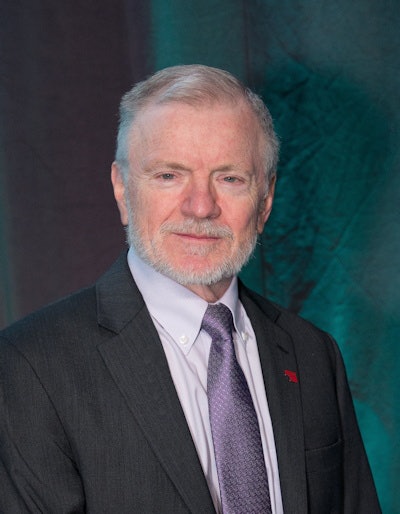
You win some, you lose some. That adage could apply to the efforts of the nuclear medicine and molecular imaging community over the past year, according to the president's address by Alan Packard, PhD, at this week's annual Society of Nuclear Medicine and Molecular Imaging (SNMMI) meeting.
In terms of its advocacy efforts, SNMMI can count as a win the decision by the U.S. Centers for Medicare and Medicaid Services (CMS) to retire its policy not to cover FDG-PET imaging of inflammation and infection. But the group's efforts in support of a bill to establish separate payment requirements for diagnostic radiopharmaceuticals fell short.
 Alan Packard, PhD. Image courtesy of SNMMI.
Alan Packard, PhD. Image courtesy of SNMMI.The retirement of the CMS national coverage determination on FDG-PET, which had been in effect since 2008, opens a path to reimbursement through coverage determinations made at the discretion of local Medicare Administrative Contractors (MACs).
"Since this decision, SNMMI representatives have been meeting with MACs to educate and inform them about the value of FDG-PET and imaging of infection and inflammation," Packard said.
SNMMI is working on appropriate use criteria for the use of FDG-PET in these cases and has also formed a new work group to create appropriate use criteria on the use of PET to diagnose fevers of unknown origin, he added.
On the down side, SNMMI's efforts fell short in support of a bill (HR 3772) that would have established separate payment requirements for diagnostic radiopharmaceuticals. Currently, CMS treats PET radiopharmaceuticals as part of the packaged cost of the procedure in hospital outpatient settings.
"The bill received broad bipartisan support, but it was not included in last year's appropriations legislation. As a result, the bill died when Congress adjourned," Packard said.
The bill has been renamed the Facilitating Innovative Nuclear Diagnostic Act of 2021, or the FIND Act, and SNMMI will continue work on reintroducing the legislation this year, he added.
Looking back on other initiatives, Packard said he was proud of the work put in to create the SNMMI Diversity, Equity, and Inclusion Task Force. One of its first accomplishments was the creation of an institutional statement on diversity, equity, and inclusion, which has been approved by the society's board of directors.
"The task force also launched a series of inclusive gatherings as a way to bring together underrepresented minority members and individuals who support and encourage the society's commitment to diversity," he said.
Packard is the outgoing president. Dr. Richard Wahl will serve as president for the 2020-2021 term. The society announced its new slate of officers on June 15 during the annual meeting.





















